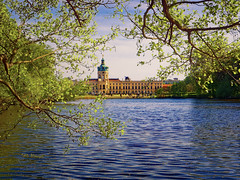Alan Watts on Nature:
The way an ecologist describes human behavior is that an action – what you do – is what the whole universe is doing at the place you call here and now. You are something that the whole universe is doing in the same way that a wave is something that the whole ocean is doing… The real you is not a puppet which life pushes around; the real, deep down you is the whole universe.
(from the Alan Watts Podcast, Man and Nature #1)
The Earth as a Battery
I’ve been thinking a lot about the global warming debate lately, and I feel that the two sides that get the most media exposure are generally pretty annoying to listen to. On one side there are conservative republicans who simply refuse to hear anything that may support the hypothesis that temperature rise is being triggered by humans. On the other side there are whiny liberals who seem to think that government sponsored emissions reduction programs are all that is needed to save us from impending doom. To me, global warming is sort of a non-issue. Whether or not you believe that changes in the climate are man-made or natural, you cannot easily deny that changes are happening, nor can you deny that nearly everyone in America is using more than their fair share of resources, simply based on the level of poverty elsewhere. If there were enough available resources to go around, they would. The fact that people are poor and animals are dying shows us that either there is simply not enough for everyone, or too few people control too much. In either case, there is a clear, easy solution hanging right under our noses: USE LESS. Everyone in the world cannot live like Americans have been. That we continue to do so in the face of this knowledge is not only selfish and ignorant, but irrational. Our wealth depends on the poverty of others for its sustenance, and as the American Dream becomes ever more prevalent across the globe, the people it fucks over are getting fucked harder and harder. Whether or not this lifestyle can last is not a question. Just like your brand new laptop, it is designed to fail, making the question not if it is going to happen, but when.
Spring Fever
Warm weather is finally here, it seems, and it is wonderful. Yesterday the temperature broke 30°C for the first time this year, and in celebration I went out for ice cream with Christie, Polly, Devon and Evan. After polishing off a waffle cone dripping with butter pecan and black raspberry, we drove down to Scudder’s Falls and swam in the Delaware. There were bugs everywhere, and we found a snake slithering around in the water. Luckily I managed to avoid getting sunburned and snakebitten.
The one downside to this weather is that school is unfortunately still in session. I have more work now, what with finals coming up, than I have all semester, and at the same time (though I wouldn’t have thought it possible) even less inclination to do any of it. I just can’t shake the feeling that none of it means anything, really. In two years what will it matter if I got a good grade on a paper on Leibniz and the Problem of Evil? Until recently much of what I thought of as my life existed abstractly as little numbers in teachers’ gradebooks and collections of binary data saved on hard drives. I’ve measured much of my success as a person with a standard that lacks any real existence. It’s not that I don’t see value in education, I just think that the practice of quantifying progress with graded assignments forces a somewhat arbitrary distinction between one’s education and one’s life. It makes learning a job, school an ordeal that must be met with and conquered as a prerequisite for “success.” As someone who genuinely enjoys learning (and who was at times identified only as “the smart kid” in gradeschool), I’ve often felt that I’d somehow be less of a person if I failed to make the grade. This is simply not true. Education is not a process with a clearly defined start or finish; it doesn’t begin when the school bell rings and it doesn’t end at graduation. It is a process that is coextensive with life itself. “I think, I am.” not “I think until I graduate, then I am.”
Christopher Hitchens vs. Frank Turek
On March 31st TCNJ’s Secular Student Alliance and Protestant Bible Fellowship teamed up to bring Atheist author Christopher Hitchens and Christian theologian Frank Turek to campus to debate whether theism or atheism better explains reality. It was a fairly interesting debate, but neither side really brought anything new to the table. Turek put forth several standard cosmological and teleological arguments for the existence of God, and Hitchens cited numerous instances of the problem of evil and said essentially that we cannot truly know either way, but that atheism is the best and most probable of available explanations.
In the end, neither speaker could agree on a grounds upon which to argue. Hitchins insisted on talking about ethical issues associated with religious belief on earth, at one point challenging the audience to think of a single moral action exclusive to religion that an atheist could not do, and then rattling off a list of immoral acts committed in the name of religious beliefs. Turek, on the other hand, invariably returned to a teleological argument for intelligent design on a cosmic scale, citing the precise calibration of the physical constants that create the possibility for human life, and the low probability of their arising as they have at random, as evidence for an intelligent first cause.
For me, the more arguments for either side I hear, the more agnostic I become. Either side can be argued for eloquently and soundly, but in order to have any real conviction one way or the other, it seems that either faith, or something like it perhaps, is required. I have yet to meet anyone who holds a belief in God with absolute certainty who does so based on reason alone. Generally, such a belief is based on a religious experience, and while one who holds it will of course attempt to verify their view logically, the ultimate source of his conviction is not in the logic, but in the experience. Similarly, empiricist beliefs that deny God require faith that one’s senses are veridical, that the world can indeed be adequately explained solely by observation and quantification. Without real conviction that this is the case, it would be very difficult to practice science sincerely. As Turek pointed out in the debate, not only is faith required to believe that a God created the universe and perfectly calibrated it for human life, but it is equally necessary for the belief that the everything we know has fallen into place at random.
Some interesting quotes from the debate:
“A good man left to his own devices will do good, and an evil man will do ill, but if you want to make a good man do evil, make him religious.” – Christopher Hitchens
“Even though Christopher says in his book, ‘there is no god and I hate him,’ God says ‘there is a Christopher Hitchens and I love him.’” – Frank Turek
And one awful one:
(On why there isn’t more debate about theism from an Islamic perspective) “…because people don’t want to have their heads cut off.” – Frank Turek














Recent Comments